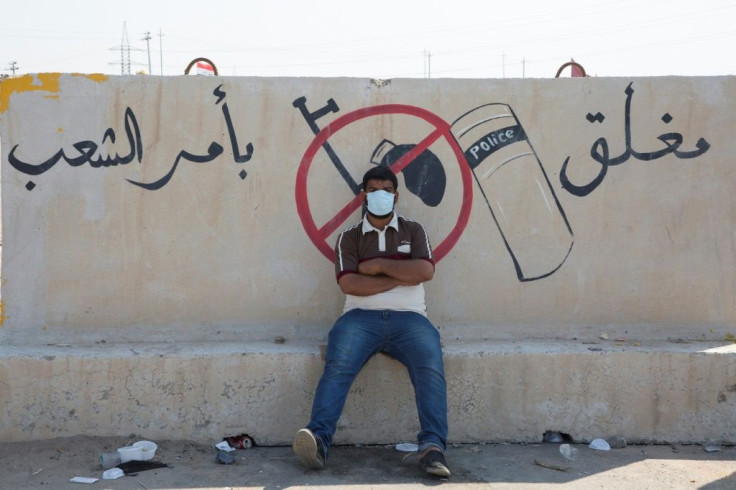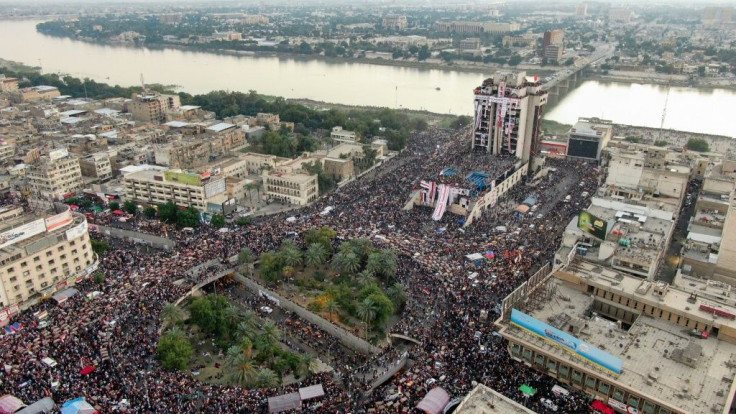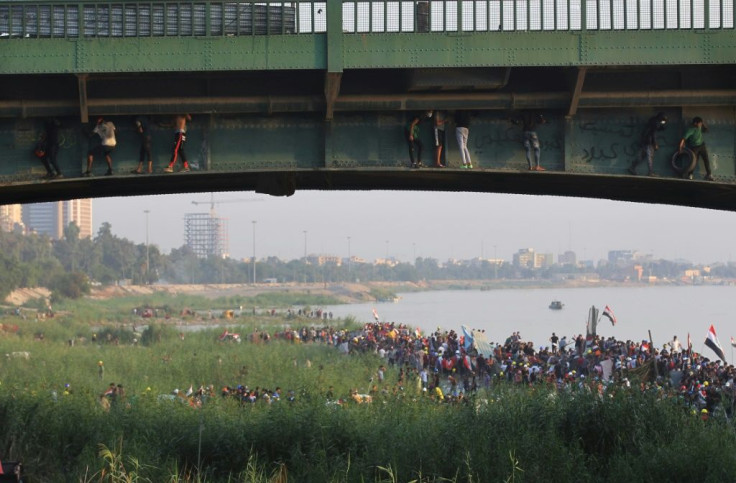Blocking Police At Checkpoints, Iraqis Revel In People Power

"I'm sorry, I can't let you through without orders," said the Iraqi civilian manning the makeshift checkpoint, smirking at the befuddled policeman he had waved down in the capital Baghdad.
After a month of defying official curfews and road closures to protest, Iraqis have flipped the rule book.
One recent evening, police officers erected a row of concrete t-walls on the same street, sealing off access to Tahrir Square, ground zero for protests in the capital.
Demonstrators -- one riding a motorised red rickshaw known as a tuk-tuk -- sprung into action, chasing down the police.
The tuk-tuk came to a screeching halt in front of the truck, blocking its exit as young Iraqi men pressured officers to reopen the road to Tahrir.
Improbably, the officers relented, and the enormous truck reversed up the road to lift the barriers as the victorious tuk-tuk followed.
Protesters swiftly hung a sign nearby: "Re-opened by order of the people!"

Demonstrations broke out on October 1 in outrage over rampant corruption and unemployment. They were met with a violent crackdown that left dozens dead.
Since resuming later last month, the protests have shifted to campaigns of non-violent resistance.
By order of the people!
Across the country's south, Iraqis are carrying out sit-ins at schools, on highways and main bridges, and near government buildings.
"No country? No class!" is the new slogan for thousands of Iraqi university students and school children refusing to go back to class until they see sweeping reforms.

The teachers' syndicate has extended its strike, despite threats from officials that protesting students or staff would face legal consequences.
Most official administrations have been shut in large cities, with large banners also proclaiming the newfound authority: "Closed by order of the people!"
In Diwaniyah, 200 kilometres (130 miles) south of Baghdad, the government's provincial headquarters has literally become a dump.
The building has been shuttered since protesters stormed it last month, and now rubbish trucks and residents add daily to the growing piles of trash there.

And in Rumaitha, the southern town known for sparking Iraq's 1920 revolution against the British mandate, residents are giving the government a taste of its own medicine.
At the heart of a recent demonstration there, a protester grabbed a megaphone and cleared his throat.
"We are declaring a curfew on all government employees and vehicles, and the closing of all party headquarters!" he declared, as people cheered all around him.
Cities and towns across the south have imposed curfews in an attempt to clamp down on protests, but as the movement drags on, residents are increasingly ignoring the restrictions.
Tables turned
In Baghdad, the military announced last week it would begin imposing a nightly curfew from midnight until 6:00 AM.
That evening saw the largest protests yet in Tahrir, as streams of people defied the order and declared their opposition to the government.
They have remained camped in the square, setting up tents and occupying an 18-storey building long known as "the Turkish restaurant". Now it is called, among other names, "Revolution Mountain."
From there, young men watch the crowds gathering in Tahrir and along the key Al-Jumhuriyah bridge leading into the Green Zone.
Riot police have set up barricades along the bridge to keep protesters from entering the enclave, where government offices and embassies are located.
For those watching from above, their perch provided them a rare opportunity to monitor -- and mock -- security forces.
"Welcome to the morning shift!" they call out over loudspeakers to the fully-equipped police units below, before blaring Arabic love ballads typically heard on morning radio in Iraq.
Down below, protesters hand out fake Iraqi identity cards, where the nationality is listed as "Honorable Iraqi," and profession as "peaceful protester".
Beyond the jokes, the demonstrations have taken on a more serious tone in recent days. Groups hold discussions on politics and economics, even debating the constitution, article by article.
Some advocate for a return to a presidential system, others even say Iraq needs a dictator.
But they are united in condemning the current system.
"The competent people, they're over here in Tahrir -- not over there," one protester said, gesturing towards the Green Zone.
© Copyright AFP 2024. All rights reserved.





















